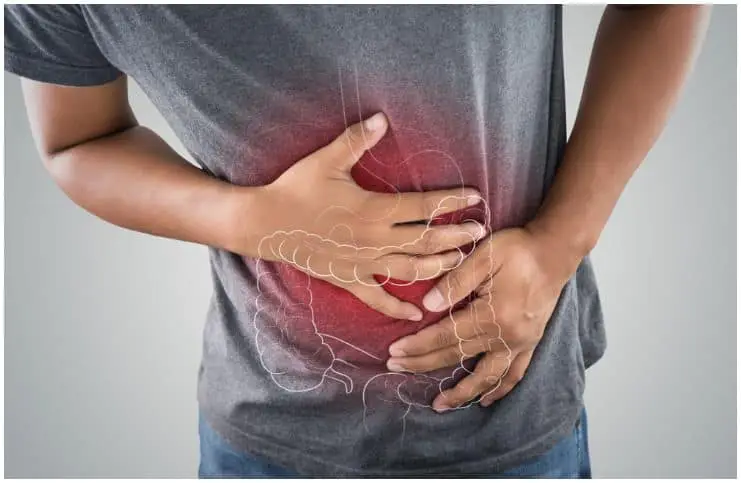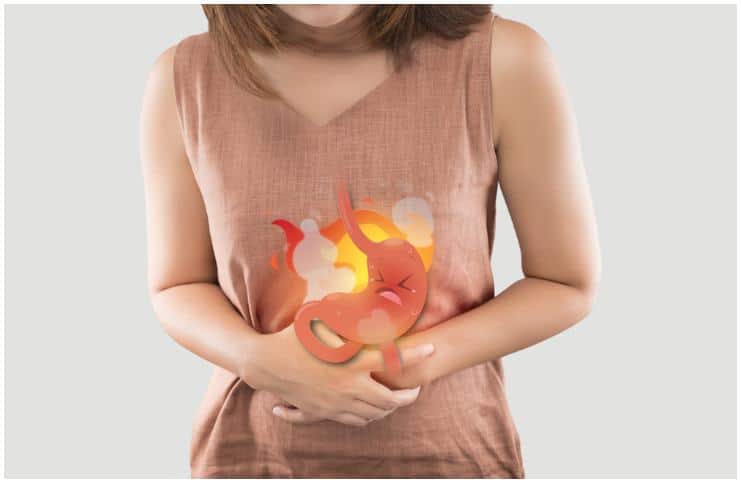Peptic Ulcer
A peptic ulcer is actually a sore in the upper small intestine or the inner lining of the stomach.
This makes the digestive acids eat away at the tissues which line the stomach, leading to an ulcer.
This condition can lead to internal bleeding, which occasionally can mean you will need blood transfusions in the hospital.
About 10 percent of people living in Western countries will have this condition at some point in their lives. In the United States, it affects more than 4.5 million people annually.
The occurrence is similar in women and men. Approximately 8%-11% of women and 11%-14% of men will develop a peptic ulcer in their lifetime.
Symptoms
Belly pain can last a few hours, which typically goes away for a while after taking an acid reducer or antacid.
A burning pain that feels like hunger-between the breastbone and the navel.
The pain usually occurs when the stomach is empty, like – during the night or between meals.
Retching – this looks as though you are about to vomit but not actually vomiting.
Causes
This condition is strongly related to H. pylori bacteria, a type of bacteria that tends to attack the stomach lining and grows in the digestive tract.
Taking nonsteroidal anti-inflammatory drugs (such as ibuprofen, aspirin, indomethacin, etodolac, diclofenac, or diflunisal) can irritate the lining of the small intestine and stomach.
H. pylori, which can be passed from individual to individual or through water and food, is located in fifty percent of patients with peptic ulcer.
READ MORE: Pituitary Apoplexy – Spiritual Meaning
GERD (Gastroesophageal Reflux Disease)
Gastroesophageal reflux disease, commonly called heartburn, occurs when the amount of gastric juice that refluxes into the esophagus exceeds the normal limit.
Statistics
GERD is the third most common gastrointestinal disorder in the United States.
According to the American College of Gastroenterology, an estimated 60 million people in the United States experience heartburn at least once a month.
Symptoms
The most common gastroesophageal reflux disease symptom is heartburn – a burning sensation in the center of the chest that occasionally spreads to the throat.
Other symptoms include:
- a sense of a lump in the throat;
- pain in the upper abdomen;
- waking up with a choking sensation;
- non-burning chest pain;
- chronic sinusitis;
- difficulty swallowing;
- recurrent lung infections;
- painful swallowing;
- worsening dental disease;
- persistent laryngitis/hoarseness;
- a taste of acid in the throat;
- a persistent sore throat;
- regurgitation of foods/fluids;
- asthma only at night.
Complications
GERD can lead to:
- scar tissue in the esophagus;
- bleeding in the esophagus;
- redness and irritation in the esophagus.
According to recent research, gastroesophageal reflux disease may be the main cause of asthma symptoms in the very young.
Moreover, some studies have shown that the incidence of anxiety in individuals with gastroesophageal reflux disease is substantially higher than in people without this disease.
Causes
Patients with gastroesophageal reflux disease commonly have excessive acid exposure to their esophagus because the esophageal sphincter (LES) does not seal tightly.
The LES is a muscle at the bottom of the food pipe.
READ MORE: 10 Herbs For Good Luck
Things that can weaken or loosen the lower esophageal sphincter include:
- the use of medications – nonsteroidal anti-inflammatory drugs (like – aspirin, ibuprofen, and Aleve);
- certain foods such as peppermint, chocolate, and high-fat foods; also, frequently drinking very hot liquids may increase the risk of GERD;
- hormone changes during pregnancy can allow the muscles in the esophagus to relax more frequently;
- being overweight or obese increases the pressure on your abdomen, making gastroesophageal reflux disease symptoms worse;
- a bulge in the stomach that protrudes above the diaphragm (hiatal hernia);
- smoking cigarettes – it decreases the amount of saliva you produce, making your stomach to empty more slowly;
- alcohol – according to studies, the intake of alcoholic beverages 3 hours before bedtime can result in a night of heartburn.
Diagnosis
Gastroesophageal reflux disease is occasionally diagnosed based on symptoms; however, your healthcare provider may use the following tests:
- Manometry;
- Esophageal monitoring;
- Endoscopy;
- Upper GI series X-rays.
READ MORE: Tuberculosis – Spiritual Meaning
Peptic Ulcer – Spiritual Meaning
 The peptic ulcer is found in a person who can not exteriorize feelings and aggression, and they return to herself. It is a kind of self-destruction for the stomach, which begins to digest itself.
The peptic ulcer is found in a person who can not exteriorize feelings and aggression, and they return to herself. It is a kind of self-destruction for the stomach, which begins to digest itself.
Accept your feelings and stop avoiding conflicts. Open up to the impressions from the outside, consciously digest them and also accept your aggression.
Admit that you are eager for protection from childhood, such as the desire to be loved and to be cared for.
READ MORE: Hyperopia – Spiritual Meaning
Emotional Causes & Spiritual Meaning of GERD (Heartburn)
If you swallow your anger again and again, the stomach juice will become very acidic in an unconscious attempt to expose your feelings, which will lead to a burning sensation.
At the same time, it creates pressure that prevents the amount of the future meal.
Swallowing food disturbs you. Realize that there is a sense of everything in life, including how you react. Understanding it will give you a sense of confidence and security that will help you to express your needs and anger (if it’s still there) much more freely.
Prevention
Certain lifestyle habits and choices can considerably lower the risk of developing these stomach problems. They include:
Reduce The Use Of NSAIDs
If you are taking nonsteroidal anti-inflammatory drugs daily (for instance – taking aspirin for heart problems), ask your healthcare professional about taking some type of drug that can help protect your intestines and stomach from ulcers.
READ MORE: Arterial Embolism – Spiritual Meaning
Keeping Hands Clean
Washing the hands properly before eating and after using the restroom, as well as avoiding sharing drinking glasses and eating utensils, can reduce the risk of spreading or taking H.pylori bacteria.
Avoid Alcoholic Beverages
Don’t drink alcohol, especially when taking medication.
Also, in general, don’t drink more than two alcoholic beverages a day if you are a man or one if you are a woman.
READ MORE: Pinkeye – Spiritual Meaning
Sleep
Elevating the head of the bed (by propping up the bed frame or mattress) about 6 inches may reduce nighttime symptoms.
Nutrition
Even if stomach acid production increases during and after meals, the presence of nutrient-dense foods in the stomach reduces its corrosive effects.
READ THIS NEXT: Heart Attack – Spiritual Meaning
References https://www.ncbi.nlm.nih.gov/pmc/articles/PMC4223119/ https://www.sciencedirect.com/science/article/pii/S0254627215301515 https://jamanetwork.com/journals/jama/fullarticle/2521970

J green
Sunday 1st of September 2019
Thank you lovely for taking the time to help us understand and apply healthy ng from the root issues of life. I appreciate you and the whole Insightstate family. Namaste